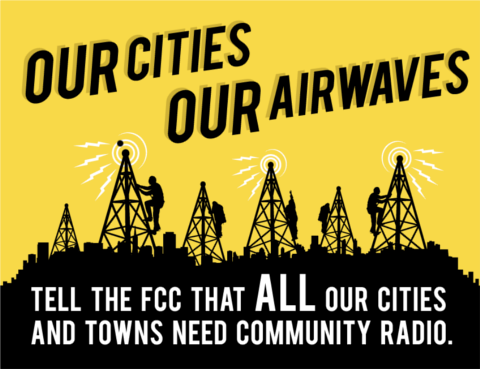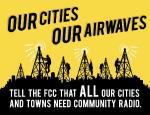Translators
Country to FCC: "Yes" to more community radio!
When the FCC asked the public to comment on a plan to reserve channels for low power radio in urban areas, the response was loud and clear: We need more community radio, in all of our cities and towns.
Our Cities, Our Airwaves: Tell the FCC that our cities and towns need community radio!

On July 12, 2011, the FCC asked the public to comment on a plan to expand community radio and allow new stations in urban areas.
Let policy makers know that your city needs local, diverse voices on the air by taking this e-action! Or download our letter writing tips and write your own letter to the FCC to tell them why you need community radio in your city or town.
Want more information?
Translating the Translators - This page explains the FCC's recently released plan in more depth.
What happens in your city? - A list of cities with an explanation of what the plan means in each place.
Thanks to the recent passage of the bipartisan Local Community Radio Act, there will soon be an opportunity to build low power FM community radio stations across the nation, and for the first time, in urban areas. Before the FCC can allocate open channels to new community stations, they must first address a backlog of thousands of pending applications for translators which are radio transmitters that repeat the signal of existing stations. The way the FCC handles this will determine whether urban schools, churches, and non-profit organizations will have access to low power radio.
Prometheus and our allies fought for ten years to pass this law because we wanted to see vibrant community radio in all of our communities. Show the FCC that this is still our priority, and join us in calling for a resolution of these pending translator applications that gives community groups in urban areas a chance at the airwaves. These are our cities, our airwaves!
Take action!
There are two ways you can tell the FCC you care about community radio.
Submit a petition letter to your elected officials and the FCC through the Media and Democracy Coalition website.
Or you can go more in depth, and write the FCC your own letter describing the need for local radio in your community, and tell them why you support preserving space for LPFM channels. Download our letter writing tips for ideas about writing and easy intstructions for submitting your letter online, and get in touch if you have any questions.
New FCC rules could bring community radio to millions of Americans
WASHINGTON DC-- On Tuesday morning the Federal Communications Commission proposed rules to create opportunities for low power FM (LPFM) radio in urban areas, bringing community radio to millions of Americans for the first time. Tuesday’s proposal is the FCC’s first step towards implementing the bipartisan Local Community Radio Act.
“I am delighted to see that the FCC is moving forward to carry out legislation I championed for so many years. This is a major victory for community radio, and I urge the FCC to license as many LPFM stations as possible," said Congressman Mike Doyle (D-PA), lead cosponsor of the Local Community Radio Act, which directs the FCC to expand low power radio opportunities and ensure that channels are available for new stations.
Best laid plans...Two new studies show dangers of a translator “ten cap” at FCC
Update March 2012: We won! The FCC released new rules on March 19, 2012 that implement a market-by-market analysis to ensure space for new LPFMs. See our article explaining the details. Thank you to everyone who wrote letters to the FCC on this issue! The text below, from Fall 2010, is outdated. We have preserved it here to give historical background on the translator fight at the FCC.
Two studies released by Common Frequency show that a well-intentioned FCC plan may actually gut the potential of community radio. Intended as a compromise, this plan would actually hand over the vast majority of open frequencies to companies that already own stations, keeping community radio off the dial in urban areas.
Resources for writing the FCC about translators
Resources for writing the FCC about translators
Update March 2012: We won! The FCC released new rules on March 19, 2012 that implement a market-by-market analysis to ensure space for new LPFMs. See our article explaining the details. Thank you to everyone who wrote letters on this issue!
Historic accord reached between Prometheus and the Educational Media Foundation
After years of filings, counterfilings, and differences as intractable as the Hatfields and the McCoys, Prometheus and large translator network Educational Media Foundation (EMF) have come to an understanding about the future status of translators and low power FM (LPFM) stations. Translators are the mini-stations that repeat the signals of other stations, often in chains over long distances. EMF is the third largest applicant for non-commercial FCC translator licenses, with over 800 applications in the 2003 filing window.
Translators vs. LPFMs in three markets
The attached charts show the radio dial in three sample markets: Macon, Georgia, Portland, Oregon, and Los Angeles, California. You can see how many low power stations, full power stations, translators, and translator applications were in each market at the time this data was collected (around 2007).
FCC Comments on Spectrum Availability and Encroachment for LPFM - 4/7/08
10 Years On: NAB Wants Translators For AM
|
10 Years On: NAB Wants Translators For AM Billboard Radio Moniter, published July 20, 2006 By Tony Sanders
|
Everything goes in cycles, but sometimes the cycles can change direction. Back in 1997, the NAB opposed a petition to the FCC to allow the use of FM translators by AM daytimers. Now, in 2006, the NAB is telling the Commission that allowing such a use is a good thing, essentially because the competitive environment is even tougher for broadcasters on the senior band.


.png)
